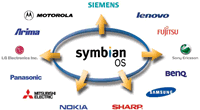 In the wake of the dot com boom, then the dot com collapse, equipment vendors have been feeling the fall-out and mergers seem to be the way to reconcile the collapsing markets. The Nokia-Siemens merger announcement bears witness to this.
In the wake of the dot com boom, then the dot com collapse, equipment vendors have been feeling the fall-out and mergers seem to be the way to reconcile the collapsing markets. The Nokia-Siemens merger announcement bears witness to this.
Though the telecoms market is still expanding, increased competition from new entrants has made life very difficult for incumbent players.
The Siemens/Nokia merger is just the latest in what’s likely to be a continuing trend, both for vendors and telecoms companies.
Nokia brings expertise in the mobile space (they previously pulled out fixed markets), while Siemens has experience in the wired and broadband markets. Though there will be some overlaps, both companies mainly concentrate in non-competing spaces and as such, they should be able to move forwards with the best of both companies to offer a strong solution for next generation networks.
 Siemens, a German giant
Siemens, a German giant
Even after disposing of their mobile arms (BenQ have already taken up the mobile phone division), Siemens is still a huge force in the world market, with over 600,000 employees. They have just disposed of parts of the companies in markets they’re not competing well in.
The BenQ buy-out of the mobile division of Siemens allows BenQ to sell phones under the Siemens brand for 18 months, and then under a joint BenQ/Siemens brand for a further 5 years, though BenQ may well drop the Siemens brand altogether. However, they are able to utilise Siemens’ retails channels and will actually based out of the Siemens mobile division in Munich.
This turns BenQ from a small phone player, to one of the larger ones. Siemens have always been good at making phone innards (radios), but their designs have been dated. BenQ must be hoping to imitate the Sony/Ericsson partnership where Ericsson made good phones that weren’t stylish, while Sony had the ergonomics, but dire insides.
Watch out for the Chinese
Though the west is merging like mad (most recently Lucent and Alcatel, both previously giants in the telecoms world) the real threat is coming from China.
 Companies such as Huawei (“wu why” sometimes pronounced “who are we” which fits their appearance into markets that they had no presence in until recently) are starting to make serious dents into the Tier 1 telecoms/ISP markets.
Companies such as Huawei (“wu why” sometimes pronounced “who are we” which fits their appearance into markets that they had no presence in until recently) are starting to make serious dents into the Tier 1 telecoms/ISP markets.
A couple of years ago, no one had heard of them. They initially attacked the core ISP market with Internet routers, and offered Cisco “clone” hardware. While Cisco might sell you a system, then you add the software and then all the extra features, Huawei offered a system with everything on in the first place for 60% of the Cisco base price. Not surprisingly in an extremely competitive market, ISPs started utilising Huawei equipment. Huawei also have a huge development resource of 10’s of thousands of high class engineers out of Chinese universities. Where Cisco might take weeks to analyse and diagnose a problem, Huawei set of team of people on the problem and can release fixes in hours.
 Now they’ve established themselves in the ISP market, the surrounding markets are being worked on (and since most ISPs are now owned by telecoms companies, it’s the telecoms markets that are easiest to move into).
Now they’ve established themselves in the ISP market, the surrounding markets are being worked on (and since most ISPs are now owned by telecoms companies, it’s the telecoms markets that are easiest to move into).
The Chinese can make carrier class equipment much more cost effectively than their western counterparts, which is why they are suffering.
As networks move towards triple and quadruple plays (voice, video, Internet or voice, video, Internet and mobile) the equipment vendors now have to compete in all these areas. Triple plays are most common currently, but as can be seen from the likes of players like Orange and NTL (both offering quadruple plays), the market is moving in that direction (Vodafone recently announced they’re moving into fixed/broadband plays).
The combination of Nokia as the mobile infrastructure side of the business and Siemens Communications as the broadband/fixed player should allow them to offer a complete solution to their existing and new customers. If they can get the synergies right, the combined might of both has a good chance of competing and ultimately surviving in this crowded arena.
Only time will tell if they can defend against the power against them.
 OK, you’re used to us breaking news here, but here’s one that slipped through without us noticing. We think it’s sufficiently important for us to swallow our pride and report it anyway.
OK, you’re used to us breaking news here, but here’s one that slipped through without us noticing. We think it’s sufficiently important for us to swallow our pride and report it anyway. Ofcom has just issued guidance that GPS repeaters are probably illegal in the UK, both in their use and their sale.
Ofcom has just issued guidance that GPS repeaters are probably illegal in the UK, both in their use and their sale. GPS devices need to be able to receive the positional information from satellites. Initially this involved having line-of-sight to the ‘birds’, but as chip-sets have improved, they’ve become more sensitive, so requiring less direct sight. If GPS units work within buildings, they do so at the sacrifice of accuracy. Even with the chip improvements, GPS will not work within buildings, and certainly not underground.
GPS devices need to be able to receive the positional information from satellites. Initially this involved having line-of-sight to the ‘birds’, but as chip-sets have improved, they’ve become more sensitive, so requiring less direct sight. If GPS units work within buildings, they do so at the sacrifice of accuracy. Even with the chip improvements, GPS will not work within buildings, and certainly not underground. Brits are going wild for the latest technological innovations according to market research firm GfK in its biannual ‘UK Technology Barometer report.’
Brits are going wild for the latest technological innovations according to market research firm GfK in its biannual ‘UK Technology Barometer report.’ Not surprisingly, smartphones continue to set the cash tills ringing with a big increase in sales, while single-function PDAs are carrying on their slow decline, with sales slumping by 38.3%.
Not surprisingly, smartphones continue to set the cash tills ringing with a big increase in sales, while single-function PDAs are carrying on their slow decline, with sales slumping by 38.3%. Last week the French legislature approved a new law which could radically change the landscape of digital audio. The so-called ‘iTunes Law’ is designed to break the control hardware manufacturers exert over the type of content that can be played by their digital music players and software. The result would be that companies such as Apple, Microsoft and Napster would have to make their data formats interoperable, thereby opening their systems to music from rivals. A regulatory body could be set up to police the sector.
Last week the French legislature approved a new law which could radically change the landscape of digital audio. The so-called ‘iTunes Law’ is designed to break the control hardware manufacturers exert over the type of content that can be played by their digital music players and software. The result would be that companies such as Apple, Microsoft and Napster would have to make their data formats interoperable, thereby opening their systems to music from rivals. A regulatory body could be set up to police the sector. The iTunes Law does, however, leave a get-out for the tech companies. A newly-added clause permits artists to exercise control over additional DRM. In short, artists could object to their music being transferred into other formats, thereby ensuring that current practices could continue unaffected. This loophole would require renegotiation of existing contracts, something Apple et al may wish to avoid given record companies’ desire to recoup perceived losses due to piracy. Lawyers observed that the new law is complex and its impact will be difficult to judge until it is tested in court.
The iTunes Law does, however, leave a get-out for the tech companies. A newly-added clause permits artists to exercise control over additional DRM. In short, artists could object to their music being transferred into other formats, thereby ensuring that current practices could continue unaffected. This loophole would require renegotiation of existing contracts, something Apple et al may wish to avoid given record companies’ desire to recoup perceived losses due to piracy. Lawyers observed that the new law is complex and its impact will be difficult to judge until it is tested in court. UK British music recording industry trade association, the BPi, has today issued a statement that they have “successfully jumped the first hurdle in its battle to have unauthorised Russian download site AllofMP3.com declared illegal.”
UK British music recording industry trade association, the BPi, has today issued a statement that they have “successfully jumped the first hurdle in its battle to have unauthorised Russian download site AllofMP3.com declared illegal.” The argument of the BPI is that AllofMP3 has no right to be selling the music, as they aren’t licensed to do so. AllofMP3 counter that they are “authorized by the license # LS-3М-05-03 of the Russian Multimedia and Internet Society (ROMS) and license # 006/3M-05 of the Rightholders Federation for Collective Copyright Management of Works Used Interactively (FAIR).”
The argument of the BPI is that AllofMP3 has no right to be selling the music, as they aren’t licensed to do so. AllofMP3 counter that they are “authorized by the license # LS-3М-05-03 of the Russian Multimedia and Internet Society (ROMS) and license # 006/3M-05 of the Rightholders Federation for Collective Copyright Management of Works Used Interactively (FAIR).” Something will go wrong sooner or later with nearly one-fifth of all notebooks, with a new hardware component needed to sort the problem, according to a new survey by industry analysts Gartner.
Something will go wrong sooner or later with nearly one-fifth of all notebooks, with a new hardware component needed to sort the problem, according to a new survey by industry analysts Gartner. Laptops have also shown a significant improvement, with features like suspension mounting of hard drives and rubber bumpers between laptop lids and keyboards helping keep the damage tally down.
Laptops have also shown a significant improvement, with features like suspension mounting of hard drives and rubber bumpers between laptop lids and keyboards helping keep the damage tally down. Motherboard fry-ups and hard drive breakdowns are now the two main sources of failure for desktops, a situation brought about by the increasingly complexity of the things, with more components being integrated into the motherboard.
Motherboard fry-ups and hard drive breakdowns are now the two main sources of failure for desktops, a situation brought about by the increasingly complexity of the things, with more components being integrated into the motherboard. Symbian, the smartphone OS company, are pulling a smart move (pun intended) by offering free assistance to Universities and their lecturers to have Symbian programming skills built into courses. Very clever.
Symbian, the smartphone OS company, are pulling a smart move (pun intended) by offering free assistance to Universities and their lecturers to have Symbian programming skills built into courses. Very clever. As a sweetener to the lecturers to get involved, Symbian will provide “exposure to Symbian’s industry partners.” Pretty healthy if you fancy running a software development company and want to get exposure for your potential products, or you’re getting a little bored of Uni life and fancy impressing those in industry that you’re a bit of visionary.
As a sweetener to the lecturers to get involved, Symbian will provide “exposure to Symbian’s industry partners.” Pretty healthy if you fancy running a software development company and want to get exposure for your potential products, or you’re getting a little bored of Uni life and fancy impressing those in industry that you’re a bit of visionary. As you may recall, we first reported the
As you may recall, we first reported the  The transfer and negotiations around the unit are likely to have given BT some food for thought as to how they can manage the disposal of business units they do not see as key, or that are giving rates of return below the main business’s targets.
The transfer and negotiations around the unit are likely to have given BT some food for thought as to how they can manage the disposal of business units they do not see as key, or that are giving rates of return below the main business’s targets. Some commentators expect ITV’s share price to renew vigour over the coming weeks, as rumours of a fresh takeover are fanned by its institutional shareholders. This is despite poor audience performance and strong competition from a publicly owned, but very commercially managed, C4. There are those who are keen to take over the ITV helm where Greg Dyke so publicly failed.
Some commentators expect ITV’s share price to renew vigour over the coming weeks, as rumours of a fresh takeover are fanned by its institutional shareholders. This is despite poor audience performance and strong competition from a publicly owned, but very commercially managed, C4. There are those who are keen to take over the ITV helm where Greg Dyke so publicly failed. Some wonder why the continued interest in ITV as the deregulated non-linear future hurtles closer, but in truth, ITV has a value in both its content and brand that may be undervalued. The channel when compared against the triple and ‘four-play’ options that are so exciting the Telco executives, still has programmes that viewers will seek out. The next 12 months are critical to the brands long term success, as it’s multi channel strategy is tested by the Freeview expansion of C5 with two more channels. Not forgetting the move of Channel 4’s film channel to an advertising supported free to air proposition, a strong assertive strategy could turn the corner for the dominant UK commercial player but more On Digital type disasters could spell a long and unpleasant demise.
Some wonder why the continued interest in ITV as the deregulated non-linear future hurtles closer, but in truth, ITV has a value in both its content and brand that may be undervalued. The channel when compared against the triple and ‘four-play’ options that are so exciting the Telco executives, still has programmes that viewers will seek out. The next 12 months are critical to the brands long term success, as it’s multi channel strategy is tested by the Freeview expansion of C5 with two more channels. Not forgetting the move of Channel 4’s film channel to an advertising supported free to air proposition, a strong assertive strategy could turn the corner for the dominant UK commercial player but more On Digital type disasters could spell a long and unpleasant demise. The other left field possibility is that US media titan Time Warner in selling off its UK AOL business has an eye on acquiring a much bigger UK fish that looks astonishingly like the UK’s main commercial TV network- eyes should be glued to the unfolding drama.
The other left field possibility is that US media titan Time Warner in selling off its UK AOL business has an eye on acquiring a much bigger UK fish that looks astonishingly like the UK’s main commercial TV network- eyes should be glued to the unfolding drama. In the wake of the dot com boom, then the dot com collapse, equipment vendors have been feeling the fall-out and mergers seem to be the way to reconcile the collapsing markets. The Nokia-Siemens merger announcement bears witness to this.
In the wake of the dot com boom, then the dot com collapse, equipment vendors have been feeling the fall-out and mergers seem to be the way to reconcile the collapsing markets. The Nokia-Siemens merger announcement bears witness to this. Siemens, a German giant
Siemens, a German giant Companies such as Huawei (“wu why” sometimes pronounced “who are we” which fits their appearance into markets that they had no presence in until recently) are starting to make serious dents into the Tier 1 telecoms/ISP markets.
Companies such as Huawei (“wu why” sometimes pronounced “who are we” which fits their appearance into markets that they had no presence in until recently) are starting to make serious dents into the Tier 1 telecoms/ISP markets. Now they’ve established themselves in the ISP market, the surrounding markets are being worked on (and since most ISPs are now owned by telecoms companies, it’s the telecoms markets that are easiest to move into).
Now they’ve established themselves in the ISP market, the surrounding markets are being worked on (and since most ISPs are now owned by telecoms companies, it’s the telecoms markets that are easiest to move into).